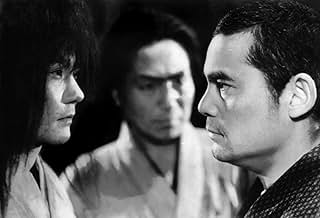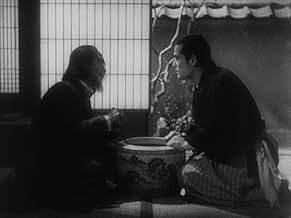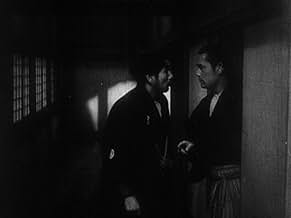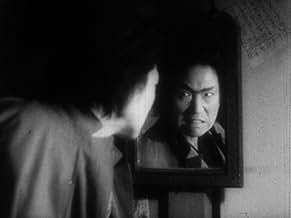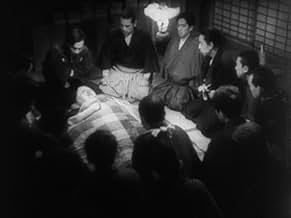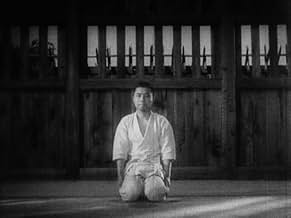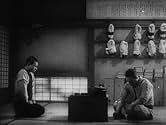VALUTAZIONE IMDb
6,0/10
2948
LA TUA VALUTAZIONE
Aggiungi una trama nella tua linguaSugata returns to prove his judo mastery in a match against Western opponents.Sugata returns to prove his judo mastery in a match against Western opponents.Sugata returns to prove his judo mastery in a match against Western opponents.
- Regia
- Sceneggiatura
- Star
Kô Ishida
- Daisuburo Hidarimonji
- (as Ko Ishida)
Osman Yusuf
- American Sailor
- (as Osman Yusef)
Recensioni in evidenza
I searched for this film for many years after having seen and loved the original. After living in Japan for a while I came across a Japanese language version.
This movie was a great disappointment to me and I'm sorry to say that Donald Ritchie's observation that Akira did not seem to take this project seriously seems to hold true. It has none of the visual or dramatic impact of the first Sanshiro film leaving only a standard Japanese propaganda film with little in the way of new scenarios,characterization or concepts.
Unfortunately, even for fans like myself of Kurosawa this film is hardly worth watching.
This movie was a great disappointment to me and I'm sorry to say that Donald Ritchie's observation that Akira did not seem to take this project seriously seems to hold true. It has none of the visual or dramatic impact of the first Sanshiro film leaving only a standard Japanese propaganda film with little in the way of new scenarios,characterization or concepts.
Unfortunately, even for fans like myself of Kurosawa this film is hardly worth watching.
I ended my recent review of "Sanshiro Sugata" by a sneaky remark. I alleged that the lead actor Susumu Fujita was no Toshiro Mifune... and I wish I could have found a more pleasant way to put it.
Now, let me reformulate. As true as it might be that Fujita doesn't have the same range, charisma or 'magnitude' than international icon Mifune, it is as unfair as comparing Harry Carey Jr. To John Wayne. And after that weird and rather corny opening, his appearance was quite a welcome sight. Indeed, something about the first minutes of the sequel of "Sanshiro Siguta" (which I prefer to refer to as "The Legend of the Great Judo") really set me off. The drunken Yankee sailor (played by Osman Yusuf!) kept blabbering some American slang with a rather convincing accent but the rickshaw was playing it it (no pun intended) as if he was playing in a Mac Senntt film.
Fujita's entrance changes the tone. He looks stern, menacing, and oddly intimidating. The confrontation did not leave much for suspense; it was obvious that for his opening fight scene would be an easy win. Still, whatever is wrong with the sequel has nothing to do with Fujita, who delivers a memorable performance as the young, idealistic and well-meaning martial arts student. It is a good thing because Siguta is in such a perpetual self-doubt that his quest could have taken a trilogy. I doubt it would have helped Kurosawa's career and I am sure he was more than glad to change this after the war. Therefore, at the end Siguta reaches his personal nirvana after Kurosawa stretched his arc as far as he could.
For the rest, it takes a while for the film to find its tone as it keeps being entangled in the necessity to make a point about the art of judo's superiority over boxing, the decadent export of US. Apparently Kurosawa was somewhat forced into making the film a propaganda by underlining without any attempt at subtitlity that boxing incarnates a failure of civilization that is so opposed to the quest of Judo... but for that, Americans are barely present and are replaced by a Japanese manager who's a caricatural sellout. While the film is by no means mediocre, it is not the master's finest hour and you can tell that if it wasn't for that propaganda subtext, it could have made for a better experience. It doesn't help that the image and sound quality (obviously not restored) make it difficult to appreciate.
Now the film is slightly better when it makes connections with the previous one and shows Sigita struggling to forgive himself for the death of Yono's father (played by Shimura in the first film) and when all of sudden, two strange long-haired characters who look like coming from a fantasy horror film and with expressionnist shadows decide to come to revenge their brothers, leading to a climax set in the snow-covered mountains. Iy is so magnificent you'd think it was borrowed from another film... and come way too late in the film.
Overall, it is a decent film but, the result is so beneath the standards of excellence of Kurosawa and of intelligence, that it will probably satisfy some history buffs looking for expressions of propaganda Japanese film and naturally the completists. Apart from that, it is a warmup before Toshiro Mifune who was certainly the muse Kurosawa needed (with Shimura being the touchstone)
Now, let me reformulate. As true as it might be that Fujita doesn't have the same range, charisma or 'magnitude' than international icon Mifune, it is as unfair as comparing Harry Carey Jr. To John Wayne. And after that weird and rather corny opening, his appearance was quite a welcome sight. Indeed, something about the first minutes of the sequel of "Sanshiro Siguta" (which I prefer to refer to as "The Legend of the Great Judo") really set me off. The drunken Yankee sailor (played by Osman Yusuf!) kept blabbering some American slang with a rather convincing accent but the rickshaw was playing it it (no pun intended) as if he was playing in a Mac Senntt film.
Fujita's entrance changes the tone. He looks stern, menacing, and oddly intimidating. The confrontation did not leave much for suspense; it was obvious that for his opening fight scene would be an easy win. Still, whatever is wrong with the sequel has nothing to do with Fujita, who delivers a memorable performance as the young, idealistic and well-meaning martial arts student. It is a good thing because Siguta is in such a perpetual self-doubt that his quest could have taken a trilogy. I doubt it would have helped Kurosawa's career and I am sure he was more than glad to change this after the war. Therefore, at the end Siguta reaches his personal nirvana after Kurosawa stretched his arc as far as he could.
For the rest, it takes a while for the film to find its tone as it keeps being entangled in the necessity to make a point about the art of judo's superiority over boxing, the decadent export of US. Apparently Kurosawa was somewhat forced into making the film a propaganda by underlining without any attempt at subtitlity that boxing incarnates a failure of civilization that is so opposed to the quest of Judo... but for that, Americans are barely present and are replaced by a Japanese manager who's a caricatural sellout. While the film is by no means mediocre, it is not the master's finest hour and you can tell that if it wasn't for that propaganda subtext, it could have made for a better experience. It doesn't help that the image and sound quality (obviously not restored) make it difficult to appreciate.
Now the film is slightly better when it makes connections with the previous one and shows Sigita struggling to forgive himself for the death of Yono's father (played by Shimura in the first film) and when all of sudden, two strange long-haired characters who look like coming from a fantasy horror film and with expressionnist shadows decide to come to revenge their brothers, leading to a climax set in the snow-covered mountains. Iy is so magnificent you'd think it was borrowed from another film... and come way too late in the film.
Overall, it is a decent film but, the result is so beneath the standards of excellence of Kurosawa and of intelligence, that it will probably satisfy some history buffs looking for expressions of propaganda Japanese film and naturally the completists. Apart from that, it is a warmup before Toshiro Mifune who was certainly the muse Kurosawa needed (with Shimura being the touchstone)
Sanshiro Sugata 2 (1945)
** 1/2 (out of 4)
Kurosawa's sequel has Sugata (Susumu Fujita) still growing in the world of judo but outsiders are wanting to make the fighting style a sport and put it up against American boxing. This is a rather strange film but I do think it's better than the original just because of how out there it is. I've read that the government forced Kurosawa into making this and you can tell because that plays a part in the film. American boxing is really looked down upon and fighting as a sport is shown to be evil and this really translates to Kurosawa being unhappy as he was forced to make this just like the characters here are being forced to do something they see as morally wrong. Seeing the different fighting styles mixed up together was pretty fun as was the ending, which takes place during a snow storm. Fujita is a lot better here than he was in the previous film and really delivers a strong performance and makes his character quite memorable with the difficulties that he faces. The film's biggest problem comes in form of some rather choppy storytelling that has the film wonder off from its main goal way too many times and this is certainly true in the final fifteen-minutes before the final showdown. The low-budget nature of the film also shines through in a negative way but I'm sure the fans of the director will want to watch this at least once.
** 1/2 (out of 4)
Kurosawa's sequel has Sugata (Susumu Fujita) still growing in the world of judo but outsiders are wanting to make the fighting style a sport and put it up against American boxing. This is a rather strange film but I do think it's better than the original just because of how out there it is. I've read that the government forced Kurosawa into making this and you can tell because that plays a part in the film. American boxing is really looked down upon and fighting as a sport is shown to be evil and this really translates to Kurosawa being unhappy as he was forced to make this just like the characters here are being forced to do something they see as morally wrong. Seeing the different fighting styles mixed up together was pretty fun as was the ending, which takes place during a snow storm. Fujita is a lot better here than he was in the previous film and really delivers a strong performance and makes his character quite memorable with the difficulties that he faces. The film's biggest problem comes in form of some rather choppy storytelling that has the film wonder off from its main goal way too many times and this is certainly true in the final fifteen-minutes before the final showdown. The low-budget nature of the film also shines through in a negative way but I'm sure the fans of the director will want to watch this at least once.
Akira Kurosawa's third film, released a year after The Most Beautiful (which he made for his wife) (actually, if it weren't for the lousy search function of Douban, there'd be no need to repeat this sort of objective reality in a review).
Akira Kurosawa himself, in his autobiography "Toad's Oil", doesn't seem to recognize much of the cinematic value of this "sequel to Zizan Sanshiro", which coincides with the popular aesthetic, the biggest criticism being the lyrical patriotism, similar to that in the modern-day Ip Man, an element that was loathed in the movies 60 years ago, and is still the case 60 years later. It's just obvious that the director, who has influenced Western cinema many times over in terms of casting and dramatization, naturally has his own insights. In the "Zi San Shiro sequel" will rarely see so involved, Kurosawa has shot, so low mobilization of nerves of film and television subject matter, at this point, I think the domestic film and television industry is still worth looking back at history to learn.
But the master is a master, after all, in the "Zi San Shiro sequel" we did not see colorful on that bad bridge too much continuation, but is point to the end, in the end oriented to the benevolence of the evil of revenge on the ending. It's as if when countless critics were giddy as if they were watching this talented Japanese director have some cracks in him, Akira Kurosawa once again backtracked on the theme of human kindness so that his early style wouldn't be so clearly labeled as patriotic.
Even now, as a director who has just made two movies, in his early work has revealed extremely artistic light and composition, in dealing with multiple people standing, not only makes people wonder if Antonioni has come here to steal the division.
Akira Kurosawa himself, in his autobiography "Toad's Oil", doesn't seem to recognize much of the cinematic value of this "sequel to Zizan Sanshiro", which coincides with the popular aesthetic, the biggest criticism being the lyrical patriotism, similar to that in the modern-day Ip Man, an element that was loathed in the movies 60 years ago, and is still the case 60 years later. It's just obvious that the director, who has influenced Western cinema many times over in terms of casting and dramatization, naturally has his own insights. In the "Zi San Shiro sequel" will rarely see so involved, Kurosawa has shot, so low mobilization of nerves of film and television subject matter, at this point, I think the domestic film and television industry is still worth looking back at history to learn.
But the master is a master, after all, in the "Zi San Shiro sequel" we did not see colorful on that bad bridge too much continuation, but is point to the end, in the end oriented to the benevolence of the evil of revenge on the ending. It's as if when countless critics were giddy as if they were watching this talented Japanese director have some cracks in him, Akira Kurosawa once again backtracked on the theme of human kindness so that his early style wouldn't be so clearly labeled as patriotic.
Even now, as a director who has just made two movies, in his early work has revealed extremely artistic light and composition, in dealing with multiple people standing, not only makes people wonder if Antonioni has come here to steal the division.
The martial arts are so dominant in Asian cultures. Kurosawa uses them in most of his films. This is the sequel to his first film, starring the same actor and character. It is rather talky. For some reason there are American sailors all over the place (I haven't had the time to investigate why so many were there in the time period shown). They have brought their great boxer, I suppose, to make them look idiotic, using fighting for profit rather than as a spiritual endeavor. Sugata is a folk hero and carries a lot of weight. When he sees a fellow martial arts expert beaten to a pulp, he feels he must do something to bring respect. Along the way, he becomes so famous (like a successful gunfighter) that the negative element wants a piece of him. There is just something lacking in this and is not the best Kurosawa (although he certainly was learning).
Lo sapevi?
- QuizThe final fight scene was filmed outdoors in real snow. Susumu Fujita, fighting barefoot, had to be carried to a bonfire between each shot as his feet would go numb.
- ConnessioniFollows Sanshiro Sugata (1943)
I più visti
Accedi per valutare e creare un elenco di titoli salvati per ottenere consigli personalizzati
- How long is Sanshiro Sugata, Part Two?Powered by Alexa
Dettagli
- Data di uscita
- Paese di origine
- Lingua
- Celebre anche come
- Sanshiro Sugata, Part Two
- Luoghi delle riprese
- Toho Studios, Tokyo, Giappone(Studio)
- Azienda produttrice
- Vedi altri crediti dell’azienda su IMDbPro
- Tempo di esecuzione
- 1h 23min(83 min)
- Colore
- Mix di suoni
- Proporzioni
- 1.37 : 1
Contribuisci a questa pagina
Suggerisci una modifica o aggiungi i contenuti mancanti

